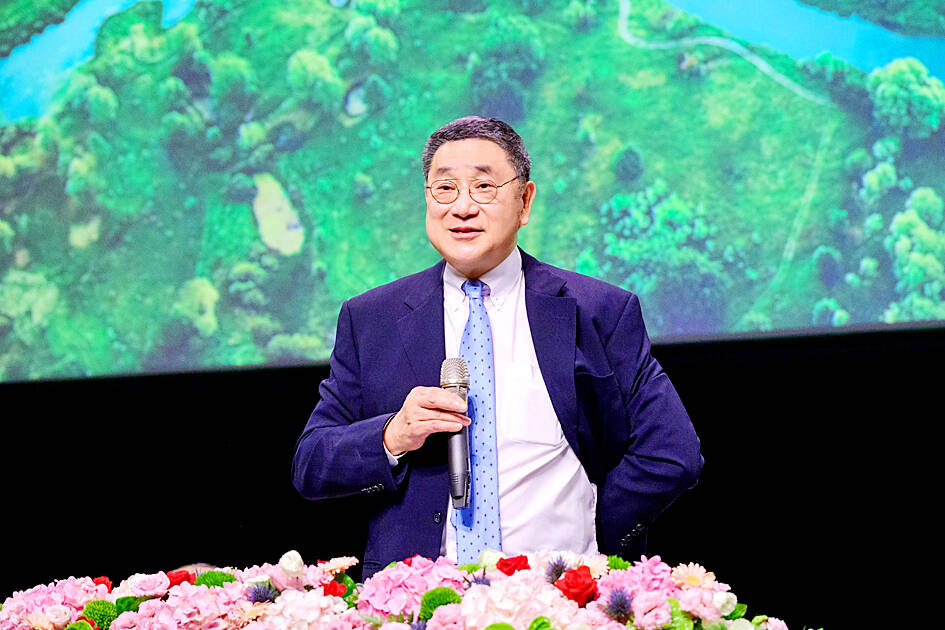Taiwan Cement Corp (台灣水泥) yesterday said that it expects cement to account for less than half of its sales by 2025, as revenue from energy storage and vehicle charging businesses pick up.
Cement production would remain the company’s core business, despite business diversification efforts, Taiwan Cement chairman Nelson Chang (張安平) said at the company’s annual shareholders’ meeting.
While the company is expanding into the green energy business in line with global efforts to curb carbon emissions, it would continue to produce up to 80 million tonnes of cement a year, Chang said.

Photo courtesy of Taiwan Cement Corp
The foray into green energy is intended to help maintain its core operations, as cement manufacturing generates considerable carbon emissions and is subject to heavy carbon taxes in different parts of the world, Chang said.
For instance, its cement facility in Portugal pays a carbon tax of US$100 per tonne, higher than the selling price of cement, he said.
As such, the company has no choice but to invest in carbon reduction ventures to stay afloat, he added.
Carbon reductions must be fast and efficient, and the use of solar and other green energy resources in producing cement is not enough to offset carbon emissions, Chang said.
That means Taiwan Cement has to press ahead and develop carbon capture techniques that would help mitigate the negative impact of cement production on the environment, he said.
Carbon reduction will be crucial for Taiwan Cement and the whole industry in the coming decades, as carbon emissions are gaining speed and causing unimaginable damage to the world, he said.
The company will continue to produce cement, because it is a basic material for all building and infrastructure projects, he said.
As cement is a social necessity, Taiwan Cement has a responsibility to help reduce carbon emissions, he added.
Chang said he has been visiting cement facilities in China every month since the nation reopened its borders late last year.
Taiwan Cement is conservative about its outlook for this year, amid global concern over curbing carbon emissions and raw material prices remaining high, albeit lower than their peak last year, officials said.
Investments in energy storage and vehicle charging would take time to make meaningful contributions to profit, they said.

The US dollar was trading at NT$29.7 at 10am today on the Taipei Foreign Exchange, as the New Taiwan dollar gained NT$1.364 from the previous close last week. The NT dollar continued to rise today, after surging 3.07 percent on Friday. After opening at NT$30.91, the NT dollar gained more than NT$1 in just 15 minutes, briefly passing the NT$30 mark. Before the US Department of the Treasury's semi-annual currency report came out, expectations that the NT dollar would keep rising were already building. The NT dollar on Friday closed at NT$31.064, up by NT$0.953 — a 3.07 percent single-day gain. Today,

‘SHORT TERM’: The local currency would likely remain strong in the near term, driven by anticipated US trade pressure, capital inflows and expectations of a US Fed rate cut The US dollar is expected to fall below NT$30 in the near term, as traders anticipate increased pressure from Washington for Taiwan to allow the New Taiwan dollar to appreciate, Cathay United Bank (國泰世華銀行) chief economist Lin Chi-chao (林啟超) said. Following a sharp drop in the greenback against the NT dollar on Friday, Lin told the Central News Agency that the local currency is likely to remain strong in the short term, driven in part by market psychology surrounding anticipated US policy pressure. On Friday, the US dollar fell NT$0.953, or 3.07 percent, closing at NT$31.064 — its lowest level since Jan.

The New Taiwan dollar and Taiwanese stocks surged on signs that trade tensions between the world’s top two economies might start easing and as US tech earnings boosted the outlook of the nation’s semiconductor exports. The NT dollar strengthened as much as 3.8 percent versus the US dollar to 30.815, the biggest intraday gain since January 2011, closing at NT$31.064. The benchmark TAIEX jumped 2.73 percent to outperform the region’s equity gauges. Outlook for global trade improved after China said it is assessing possible trade talks with the US, providing a boost for the nation’s currency and shares. As the NT dollar

The Financial Supervisory Commission (FSC) yesterday met with some of the nation’s largest insurance companies as a skyrocketing New Taiwan dollar piles pressure on their hundreds of billions of dollars in US bond investments. The commission has asked some life insurance firms, among the biggest Asian holders of US debt, to discuss how the rapidly strengthening NT dollar has impacted their operations, people familiar with the matter said. The meeting took place as the NT dollar jumped as much as 5 percent yesterday, its biggest intraday gain in more than three decades. The local currency surged as exporters rushed to